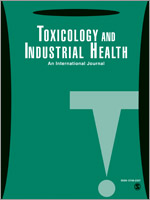Toxicology and Industrial Health
Toxicology and Industrial Health is a multidisciplinary field that focuses on understanding the effects of chemicals, toxins, and environmental pollutants on human health, particularly within industrial and occupational settings. This field combines principles from toxicology, occupational health, environmental science, and public health to assess, monitor, and mitigate risks associated with exposure to hazardous substances.
Overview[edit | edit source]
Toxicology itself is the study of the adverse effects of chemicals on living organisms, while industrial health, often referred to as occupational health, focuses on the prevention and management of workplace hazards. Together, toxicology and industrial health aim to protect workers and the general population from the harmful effects of chemicals and other hazardous agents encountered in the industrial and environmental context.
Key Concepts[edit | edit source]
Hazard Identification[edit | edit source]
The first step in the process of ensuring industrial health is the identification of potential hazards in the workplace. This involves the assessment of chemicals and substances that workers may be exposed to, including their form, concentration, and the duration of exposure.
Risk Assessment[edit | edit source]
Risk assessment is a critical component of toxicology and industrial health. It involves evaluating the likelihood and severity of adverse health outcomes resulting from exposure to identified hazards. This process takes into account both the toxicological properties of the substances and the level of exposure.
Exposure Limits[edit | edit source]
To protect workers, exposure limits are established based on scientific research. These limits, such as Threshold Limit Values (TLVs) and Permissible Exposure Limits (PELs), are designed to prevent adverse health effects.
Preventive Measures[edit | edit source]
Preventive measures in industrial health include engineering controls, such as ventilation systems to reduce airborne contaminants; administrative controls, like job rotation to limit exposure duration; and personal protective equipment (PPE), such as gloves and respirators.
Health Surveillance[edit | edit source]
Ongoing health surveillance of workers exposed to hazardous substances is essential for early detection of occupational diseases. This may include regular health check-ups, biomonitoring, and environmental monitoring of the workplace.
Challenges and Future Directions[edit | edit source]
The field of toxicology and industrial health faces several challenges, including the identification and regulation of emerging chemical hazards, the need for more comprehensive exposure assessment methods, and addressing the health impacts of long-term, low-level exposure to complex chemical mixtures. Advances in technology and research methodologies, such as high-throughput screening and computational toxicology, offer promising avenues for addressing these challenges.
Conclusion[edit | edit source]
Toxicology and industrial health play a crucial role in protecting public and occupational health from the adverse effects of chemicals and environmental pollutants. Through a combination of scientific research, risk assessment, and preventive strategies, this field helps to ensure safer workplaces and a healthier environment.
| Toxicology and Industrial Health Resources | ||
|---|---|---|
|
| |
Navigation: Wellness - Encyclopedia - Health topics - Disease Index - Drugs - World Directory - Gray's Anatomy - Keto diet - Recipes
Search WikiMD
Ad.Tired of being Overweight? Try W8MD's physician weight loss program.
Semaglutide (Ozempic / Wegovy and Tirzepatide (Mounjaro / Zepbound) available.
Advertise on WikiMD
WikiMD is not a substitute for professional medical advice. See full disclaimer.
Credits:Most images are courtesy of Wikimedia commons, and templates Wikipedia, licensed under CC BY SA or similar.Contributors: Prab R. Tumpati, MD


